QuickBooks CRM integration has been truly helpful in how I manage both customer relationships and accounting. As someone who’s used QuickBooks for years to handle everything from invoicing to transactions, I quickly realized its one shortcoming—contact management.
That’s where a good CRM comes in. Once I connected my CRM with QuickBooks, I stopped wasting time switching between platforms and started seeing real improvements in team efficiency and customer follow-ups.
Pairing QuickBooks with the right CRM software doesn’t just streamline processes—it fuels growth. Businesses using this integration have reported up to a 30% boost in productivity and a 25% drop in admin costs thanks to real-time syncing and automation.
To help you, I’ve tested and compiled 12 of the best CRM tools that integrate seamlessly with QuickBooks and can streamline your entire finance workflow.
What Is QuickBooks, and Why Do You Need a CRM That Integrates With QuickBooks?
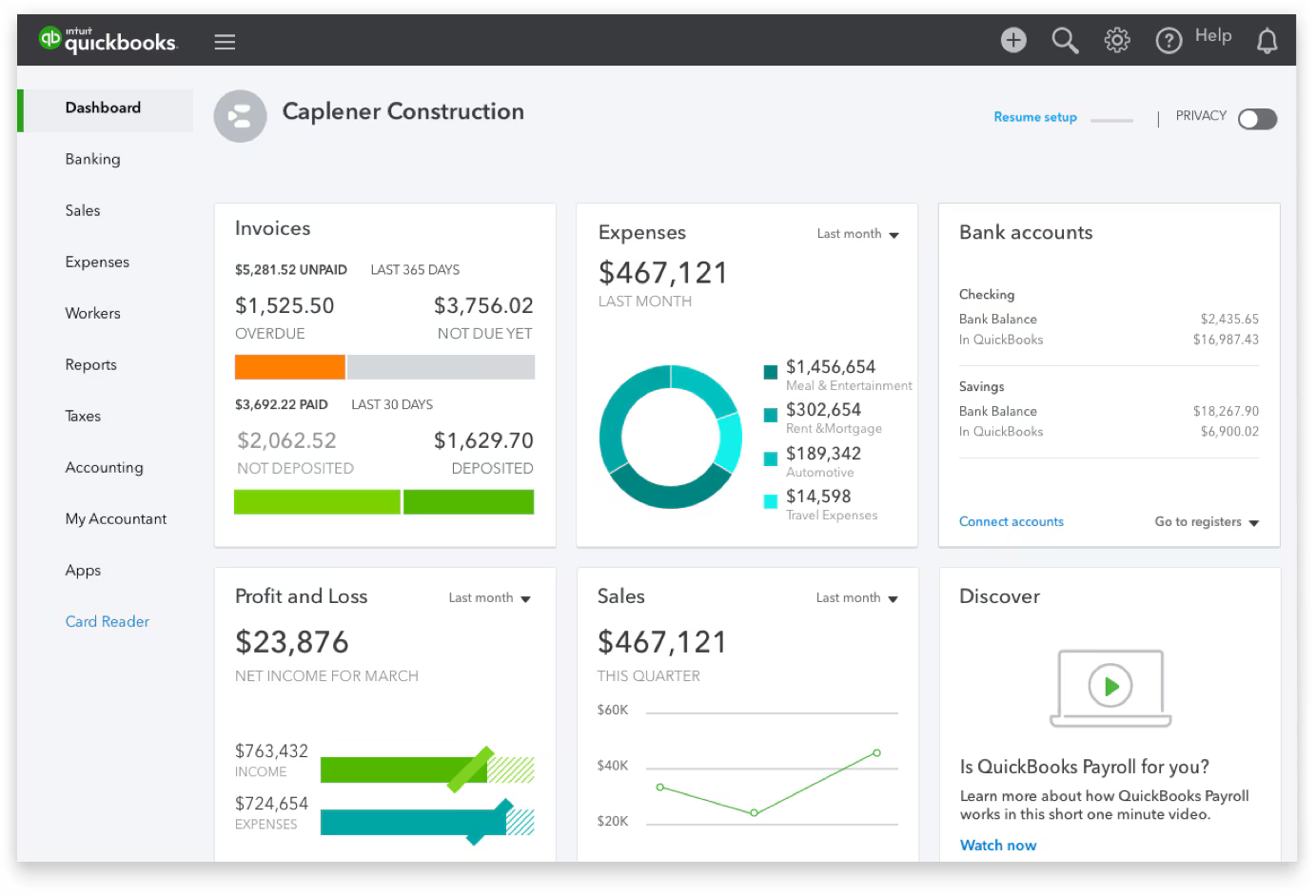
Image Source: QuickBooks
QuickBooks is an accounting and virtual bookkeeping software that enables businesses to keep track of their expenses, orders, and payments. The tool helps generate, manage, and share invoices with customers.
A CRM software that integrates with QuickBooks makes it easy for businesses to manage customer relationships and track finances. Customer relationship management tools store all essential information related to prospects and customers in one central database. Connecting this database with your QuickBooks records can help you access invoices and other related financial information with ease. Such integration conserves time for any business and also provides enhanced visibility into the financial position of the enterprise.
“Automation applied to an efficient operation will magnify the efficiency.” – Bill Gates
However, implementing a QuickBooks CRM integration requires careful consideration of technical factors, data security, and sometimes support from teams experienced in software development in Latin America or other regions
Pro Tip: Ensure your chosen CRM supports your QuickBooks edition (Online or Desktop) and follows security best practices to safeguard financial data. It’s also wise to plan for staff training to address any integration fears and help your team adapt smoothly to the new system.
Curious how modern, cloud-based CRM systems work? Here’s a complete guide to SaaS CRM to help you understand its benefits and features.
12 Best QuickBooks CRM Software for 2026
Below is a quick comparison of key features and pricing for the top CRM software solutions that integrate with QuickBooks.
| Software | Key Features | Pricing |
|---|---|---|
| BIGContacts | Contact Management & Email Marketing for Small & Medium Businesses | Forever free for small teams. Paid starts at $9.99/month |
| HubSpot | Centralizing Sales, Marketing, and Support Operations | Starts at $15/user/month |
| Nutshell | Automated sequences | Starts at $13/user/month |
| Zoho CRM | Omnichannel Engagement | Starts at $14/user/month |
| Pipedrive | Sales-Focused Teams | Starts at $14/user/month |
| Freshsales | AI-Powered Sales Campaigns | Starts at $9/user/month |
| Insightly | Automated Workflows | Starts at $29/user/month |
| Salesforce | Large and Complex Sales Organizations | Starts at $25/user/month |
| EngageBay | Targeted Marketing and Workflow Automation | Starts at $11.04/user/month |
| Keap | Sales & Marketing Automation | Starts at $79/month |
| Monday CRM | Detailed Activity Timelines | Starts at $12/user/month |
| Appy Pie Automate | No-Code Workflows | Free plan available; paid plans start at $8/user/month. |
1. BIGContacts – Best for Contact Management & Email Marketing for Small & Medium Businesses
When I first started using BIGContacts, I was looking for something simple but powerful—something that wouldn’t overwhelm me, yet would give me full control over customer relationships and financial tracking.
Once I connected it to my QuickBooks account, I was blown away by how smoothly the data sync worked. Every transaction tied to a contact record shows up inside BIGContacts without me having to lift a finger. I could finally see emails, calls, invoices, and reminders—all in one timeline.
What stood out to me was the automation. I set up task reminders and drip emails effortlessly, which helped me stay on top of follow-ups. The reports were smart, too. I could easily pull insights on sales trends or payment lags. Even on mobile, it worked like a charm, giving me access to client records on the go.
If you’re new to CRM automation or want to explore its full potential, check out this Complete Guide to CRM Automation for everything you need to know.
Here’s what Lynn Kramar, General Manager at Anchor Resort & Condominiums, shared about his experience with BIGContacts:

Pros:
- Automate tasks and reminders to meet deadlines consistently
- Smart reports to gain insights into your business
- Drip emails to send personalized emails to prospects and customers
- Ability to track all contact details, transactions, emails, calls, and other interactions with clients from a single place
Cons:
- No downloadable or on-premise version
- No dedicated account manager for the free plan, unlike paid
Pricing:
Forever free for small teams. Paid starts at $9.99/month
2. HubSpot – Best for Centralizing Sales, Marketing, and Support Operations
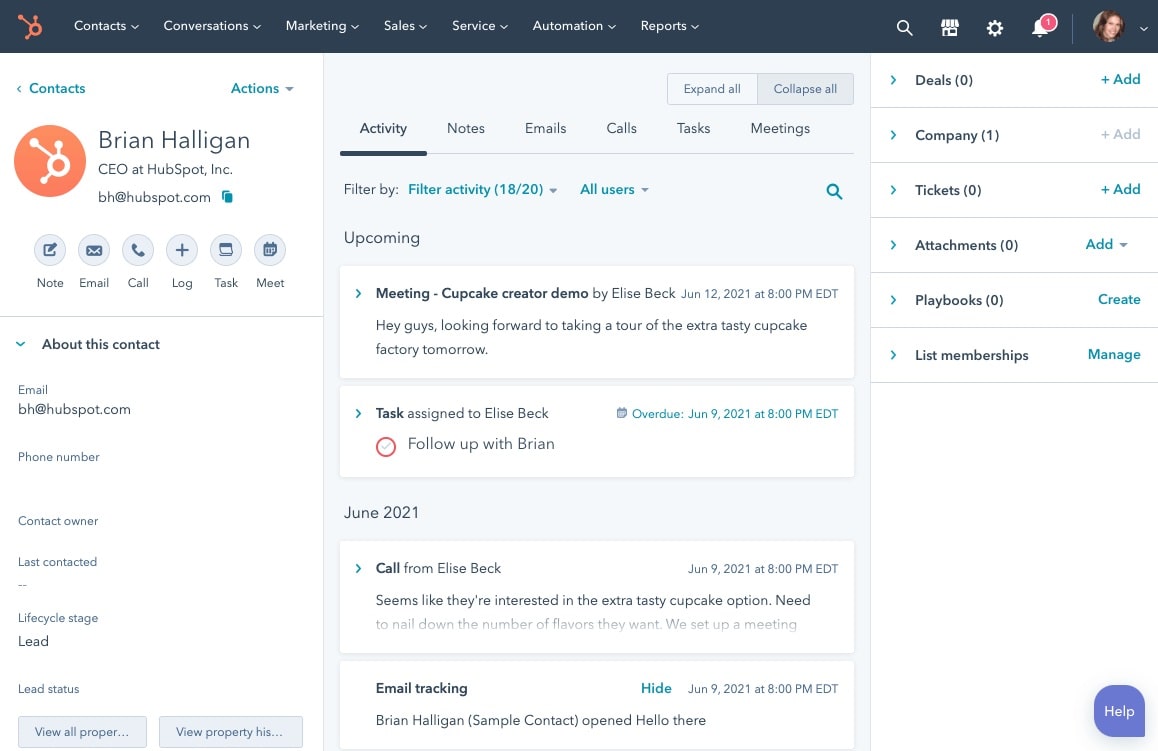
Image Source: HubSpot
Using HubSpot with QuickBooks felt like finally linking the heart and brain of my business. It is one of the best CRM software for QuickBooks, and setting up the integration was easy. Once it was done, I could instantly view QuickBooks data, like open invoices, directly from the contact records in HubSpot. That meant my sales and support teams didn’t have to keep jumping into accounting software just to check payment status.
Plus, the email tracking features made it super easy to follow up on quotes and nudge leads that had gone cold. One of the biggest wins for me was how HubSpot enriched contact profiles automatically. It pulled in data from multiple sources and gave me a clearer picture of who I was dealing with.
That made our email marketing campaigns a lot more targeted and effective. That said, I did feel the limitations of their reporting unless I upgraded, and costs added up quickly when layering on premium features.
Pros:
- Track interactions with clients and view QuickBooks transactions within the specific contact records
- Automate tasks to improve contact management and eliminate manual work
- Monitor email engagement and get notified when prospects open or click your emails
- Nurture more prospects into customers with personalized bulk email campaigns
Cons:
- More advanced reporting capabilities are desired for deeper analytics.
- The tool’s pricing structure can become steep as you upgrade tiers.
Pricing:
Starts at $15/user/month.
3. Nutshell – Best for Sales Automation
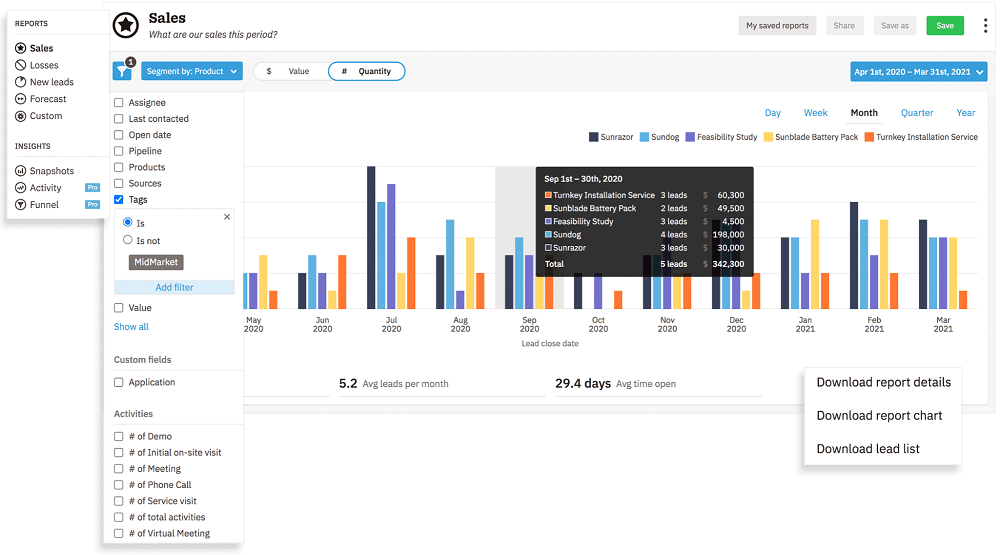
Image Source: Nutshell CRM
I didn’t expect Nutshell to be as polished as it is, but once I tried it, I was impressed. What sealed the deal for me was how effortlessly I could push customer and invoice data between Nutshell and QuickBooks.
The integration ensured that all my sales interactions were backed by up-to-date financial info, so I wasn’t guessing whether a client had paid or needed a gentle reminder. That visibility into historical transactions helped me tailor follow-ups and prevent awkward surprises.
Another thing I appreciated was how the CRM allowed me to automate my sales workflows. I built sequences that triggered based on client actions, like receiving an invoice or making a payment. It cut down a lot of manual effort and ensured my team stayed consistent in nurturing leads. That said, I found the search function to be a bit clunky when I had to dig through lots of records.
Pros:
- Send contacts from the CRM to QuickBooks and vice versa.
- Use data from QuickBooks to generate accurate sales and revenue reports.
- Track communication and transaction history to make future interactions more relevant.
- Automate actions, follow-ups, and sequences to enhance productivity.
Cons:
- The search function doesn’t always produce the most accurate results.
- Data import and export processes could be more user-friendly.
Pricing:
Starts at $13/user/month
4. Zoho CRM – Scalable and Affordable CRM With a Wide Range of Features
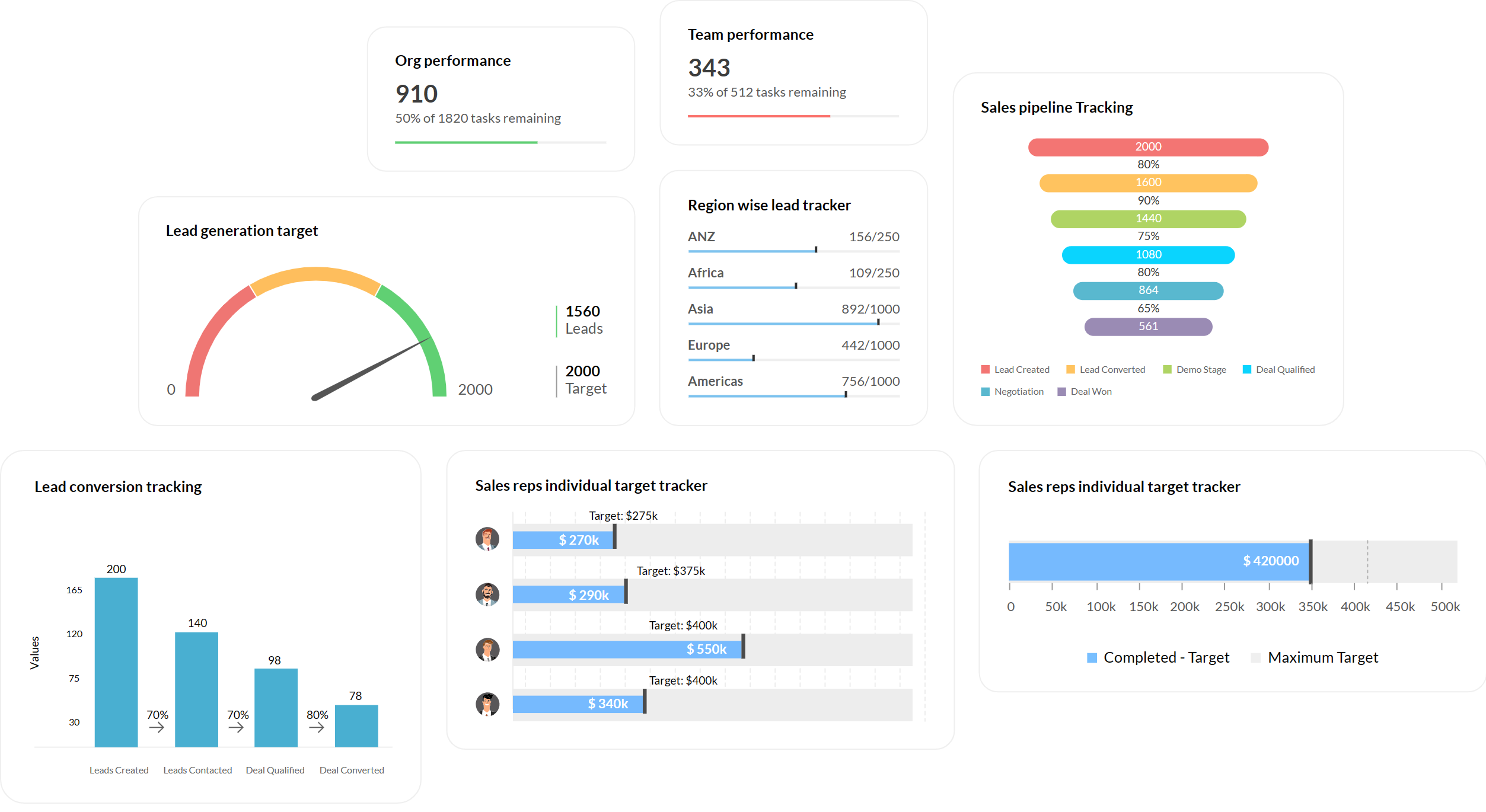
Image Source: Zoho CRM
I’ve always appreciated flexibility in a CRM, and Zoho CRM gave me exactly that, especially once I integrated it with QuickBooks. Setting it up wasn’t hard, and I could customize how invoices, customer records, and vendors sync between the two platforms.
The pre-built integration flows made it easy to automate routine tasks like invoice creation, payment tracking, and even sales forecasts triggered by transaction history. It felt like the CRM was doing half my admin work.
One thing I really liked was Zoho’s AI assistant, which made smart suggestions based on customer behavior and past invoices. It helped me prioritize whom to follow up with and what deals needed urgent attention. While the tool is quite comprehensive, I did run into a few duplicate contact issues that required manual cleanup, and I wish the support team had been quicker to respond.
Pros:
- Keep contacts, vendors, orders, invoices, etc., synchronized between Zoho CRM and QuickBooks.
- Automate complex business processes and workflows to save time and enhance efficiency.
- Specify different conditions to trigger specific QuickBooks-related actions from the CRM.
- The tool offers an AI assistant that provides recommendations and insights.
Cons:
- Duplicate contact records can sometimes form and require cleanup.
- Customer support response quality could be improved.
Pricing:
Starts at $14/user/month.
5. Pipedrive – Best for Sales-Focused Teams

Image Source: Pipedrive
Pipedrive is the CRM I reach for when sales are front and center. The visual pipeline and ease of use make it simple to track deals, but what really made it powerful for me was linking it with QuickBooks.
I loved being able to generate invoices directly from deal records and knowing that those invoices would show up in QuickBooks instantly. Plus, being able to filter them by status—paid, due, or overdue—helped me manage cash flow without needing to open multiple apps.
The integration felt smooth and natural. I also liked that I could map Pipedrive fields to QuickBooks invoice fields, so I didn’t have to manually enter data. It saved time and reduced errors. The only drawback I experienced was that only one user per account could use the QuickBooks integration, which limited collaboration on billing.
Pros:
- Get updates on the status of your invoices to know when payments are due.
- Create invoices in Pipedrive, which are automatically added to your QuickBooks account.
- Share invoice links with clients via email for easy payment.
- View all invoices and their current statuses from the deal’s detail view in Pipedrive (including whether they are paid, due, or overdue).
Cons:
- Only one user per company account can have an active QuickBooks integration in Pipedrive (this limitation can hinder larger teams).
- Limited support is provided for lower-priced tiers.
Pricing:
Starts at $14/user/month
6. Freshsales – Best CRM to Run AI-Powered Sales Campaigns
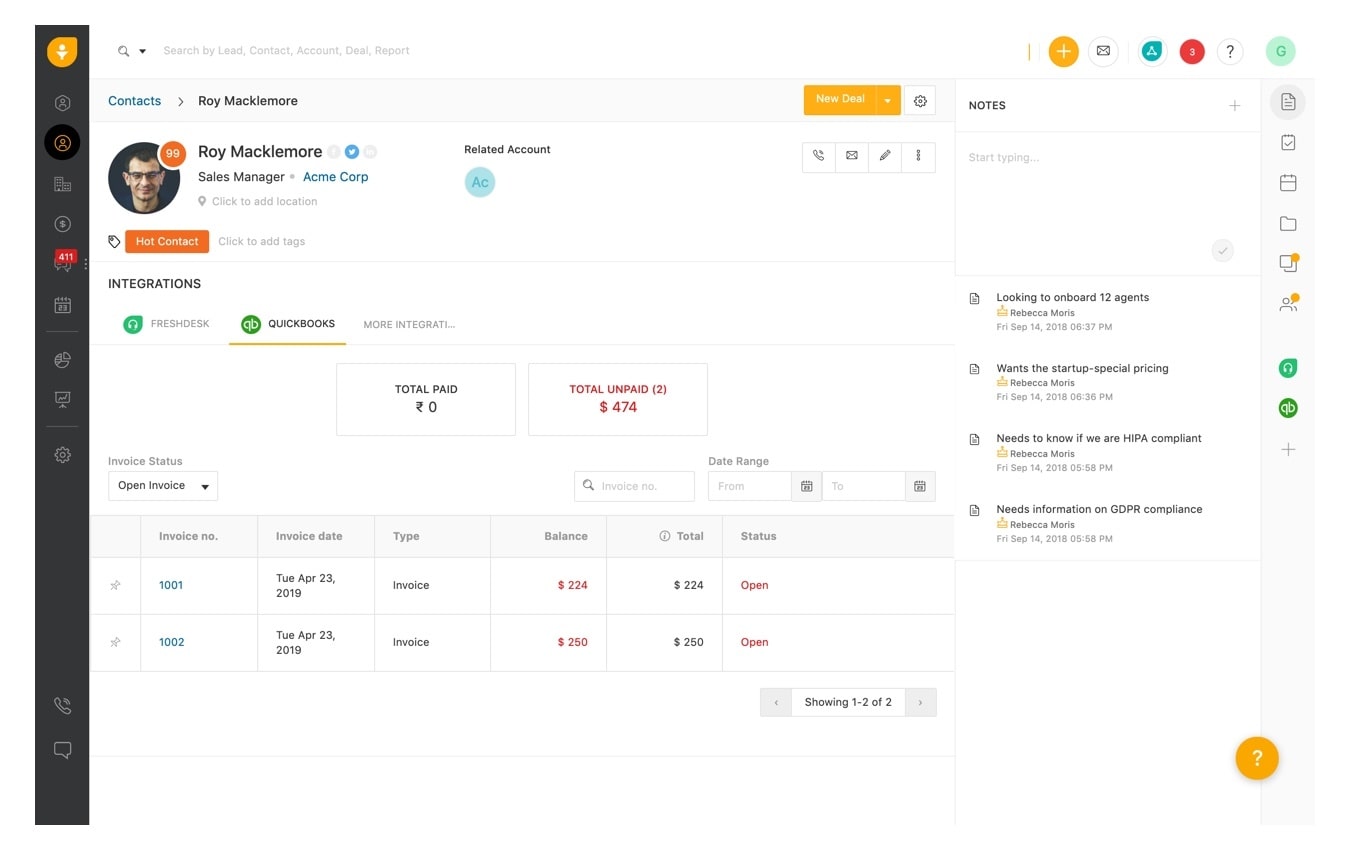
Image Source: Freshsales
Using Freshsales with QuickBooks brought a layer of intelligence to how I run my sales operations. Once integrated, every payment, invoice, or overdue bill became part of a client’s contact record. This helped me avoid awkward conversations and follow up at the right time.
What made the experience even better was the AI insights Freshsales offered. It would recommend whom to call next or which deal needed attention based on both CRM and financial data. The interface was clean, and using the mobile app meant I could check customer payment history on the go. Notifications about payments and key client actions were a nice touch—they helped me stay responsive.
While I felt the reporting could’ve been more robust without needing add-ons, the real-time access to QuickBooks data within Freshsales helped my team move faster and sell smarter. If you’re looking for a CRM that balances AI smarts with QuickBooks financial visibility, Freshsales is a strong choice.
Pros:
- Find relevant invoices and transaction histories for contacts with ease in the CRM.
- Get instant notifications for payments received or overdue invoices.
- Analyze performance and make accurate sales forecasts with comprehensive analytics.
- Access important data on the go with the Freshsales mobile app.
Cons:
- More robust out-of-the-box reporting capabilities are needed for complex analysis.
- Technical support can be slow for lower-tier customers.
Pricing:
Starts at $9/user/month.
7. Insightly – Best for Project-Oriented Businesses
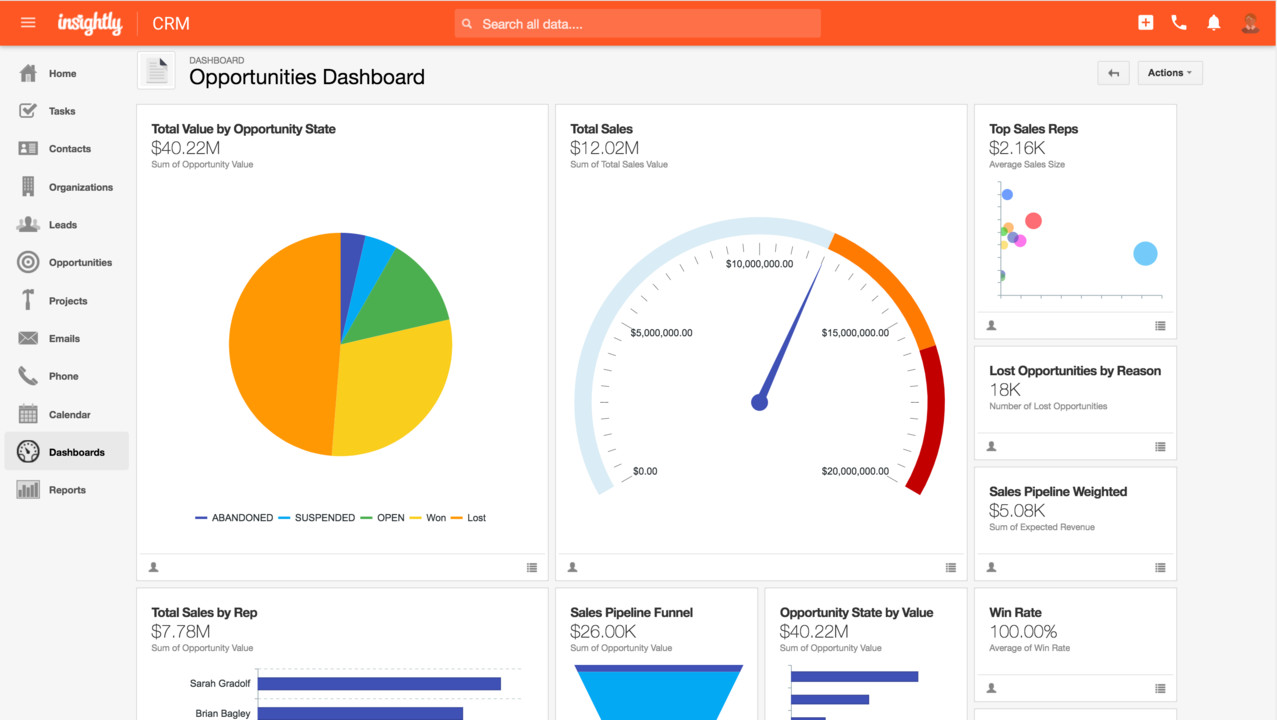
Image Source: Insightly
What drew me to Insightly was its strong project management features, but pairing it with QuickBooks made it a complete business tool. I liked that I could open a contact record and instantly see invoices tied to them—paid, pending, or overdue—without flipping between tabs.
The integration kept my financial and CRM data aligned, which was especially useful for long-term projects where timing payments and updates mattered. I also used Insightly’s custom dashboards to track financial KPIs pulled from QuickBooks, and that gave me quick visual overviews of how each client or project was performing.
The automation helped my team avoid repetitive tasks and maintain consistency. On the downside, support wasn’t as responsive as I would’ve liked, and bulk imports took a while. Still, Insightly gave me confidence that both my sales pipeline and accounting were under control, making it a solid CRM software integrated with QuickBooks, especially if your business is project-driven.
Pros:
- View pending or overdue QuickBooks invoices within the contact records in Insightly.
- Track any payment status or history conveniently from the CRM.
- Link QuickBooks invoices to contact records to avoid double data entry.
- Visualize business data with comprehensive reports and dashboards.
Cons:
- The tool lacks robust live technical assistance for troubleshooting.
- Bulk importing a large volume of contacts can be slow.
Pricing:
Starts at $29/user/month.
8. Salesforce – Best for Large and Complex Sales Organizations
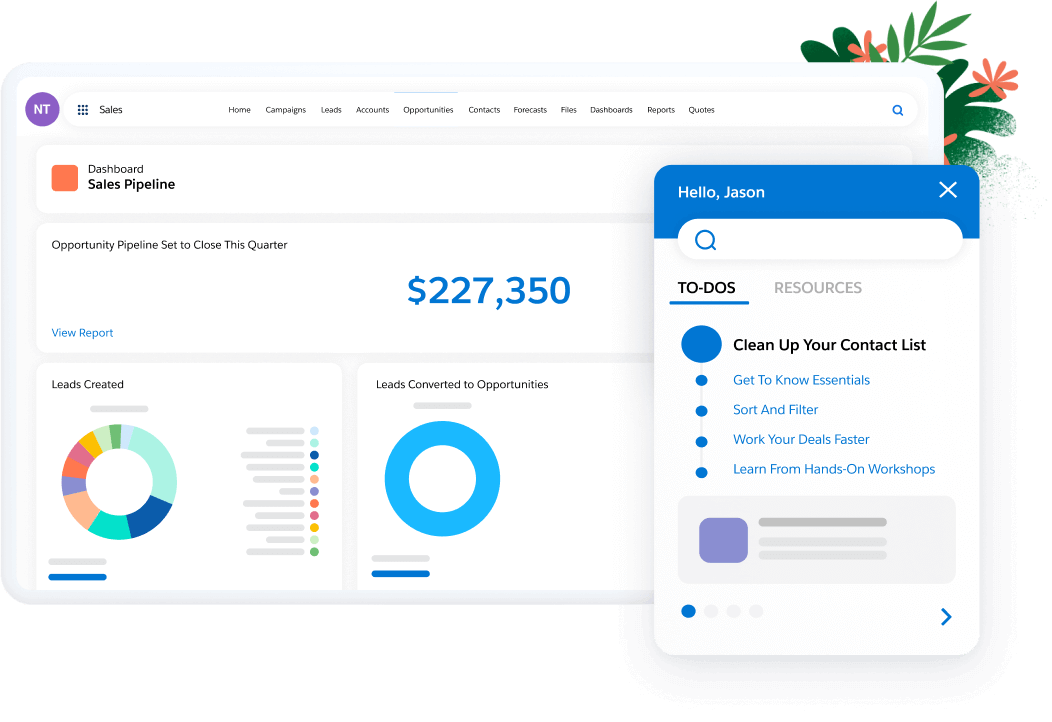
Image Source: Salesforce
I’ve used Salesforce, and integrating it with QuickBooks completely transformed how we managed both sales and finance. The moment I connected the two, I could view invoices, payment statuses, and transaction histories directly inside Salesforce contact records. It felt like I suddenly had full visibility—not just into leads and deals, but into the actual dollars behind every customer relationship.
The automation was powerful, too. I set up workflows that triggered payment reminders or internal alerts based on QuickBooks data. That alignment between sales and accounting made forecasting way more accurate.
That said, Salesforce is a bit of a beast—it took a while to configure everything, and the interface can feel overwhelming without a good onboarding plan. But once it’s set up right, it’s one of the most powerful CRM software programs that integrates with QuickBooks, especially for large teams that need customization and scale.
Pros:
- Track expenses, invoices, payments, and revenue directly from within the CRM system.
- Get a comprehensive view of your CRM and financial data on one dashboard.
- Send automated reminders for due payments to clients or sales reps.
- View customer information, previous interactions, sales orders, and payment history all on a single screen.
Cons:
- Better technical support and user training resources are needed due to the platform’s complexity.
- The interface can become cluttered, making navigation difficult without customization.
Pricing:
Starts at $25/user/month
9. EngageBay – Best for Targeted Marketing and Workflow Automation
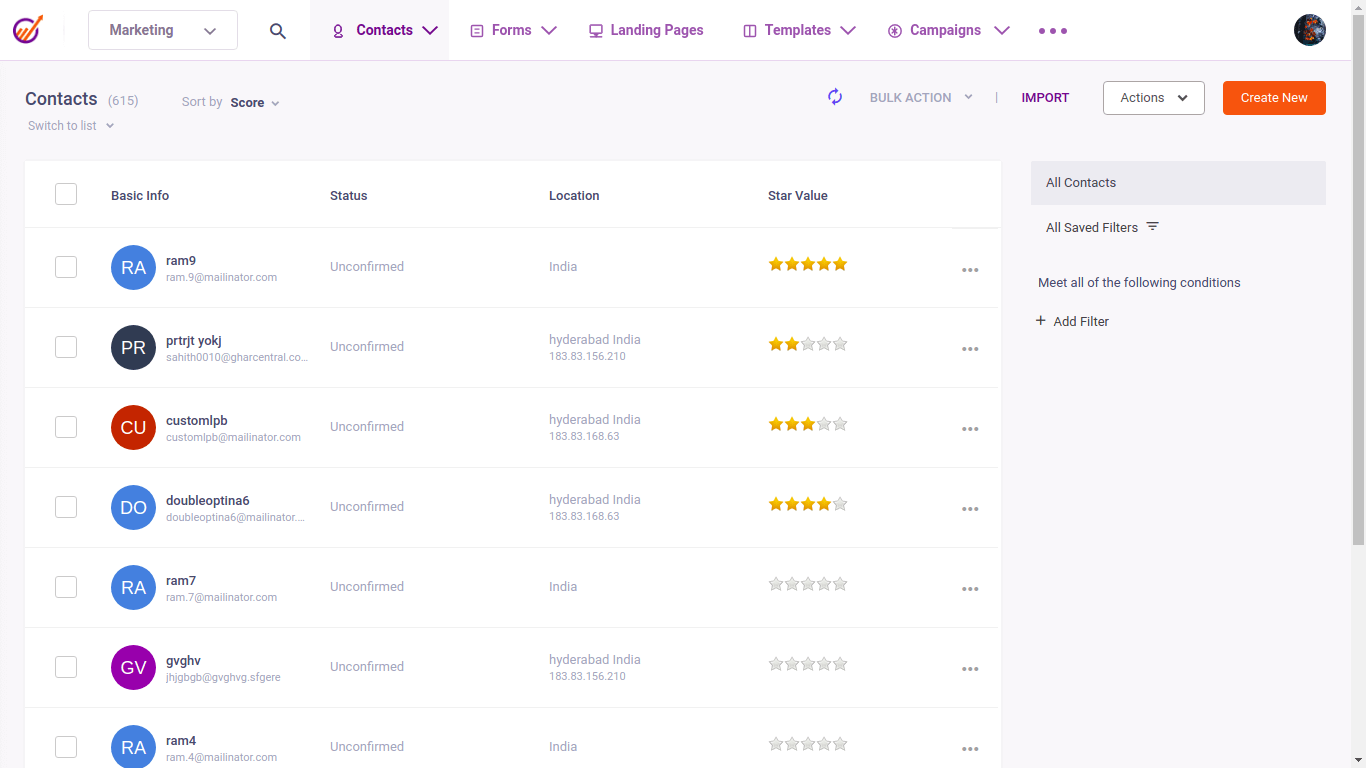
Image Source: EngageBay
I turned to EngageBay when I wanted an affordable all-in-one CRM that didn’t skimp on features, and its QuickBooks integration did not disappoint. Once linked, I could see invoices, payment history, and even overdue bills directly on the contact timeline. This helped me avoid awkward sales calls and send reminders or nurture messages at just the right moment.
What really impressed me was EngageBay’s automation engine. I was able to trigger workflows based on QuickBooks activity, like sending a thank-you email after payment or assigning a follow-up task if a payment was late. It kept things moving without manual effort.
The UI wasn’t the sleekest, and it took a bit to get used to the layout, but once I had things set up, EngageBay helped me streamline marketing, support, and billing all in one spot. For growing teams wanting a CRM that integrates with QuickBooks on a budget, this tool punches above its weight.
Pros:
- Define triggers for relevant actions between your EngageBay and QuickBooks accounts (for example, create a follow-up task when an invoice is overdue).
- Create automation workflows to save time and increase productivity.
- Track customer behavior on your site or emails and view their transaction histories in one place.
- Score leads and segment customers into distinct lists to enhance personalization in marketing.
Cons:
- The user interface could benefit from updates to improve intuitiveness.
- The learning curve is a bit long, especially for users new to CRM software.
Pricing:
Starts at $11.04/user/month
10. Keap – Best for Sales & Marketing Automation for Small/Medium Businesses
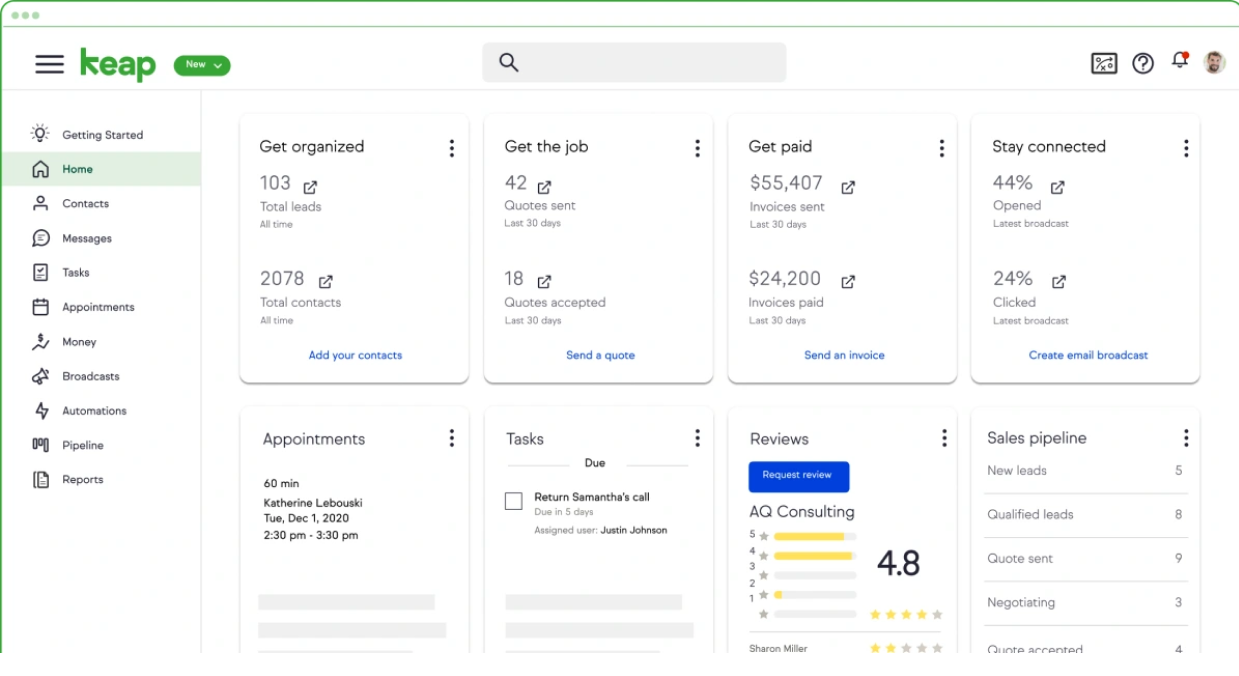
Image Source: Keap
When I started using Keap, my goal was to eliminate repetitive tasks and improve how I tracked client payments. The QuickBooks integration made a huge difference. I could pull all invoice and payment data into Keap and pair it with my automation sequences. That meant every time someone paid an invoice, I could automatically tag them, send a thank-you email, or start a follow-up campaign for upsells. It saved me hours each week.
Keap also gave me a clean view of each client’s journey—purchase history, email activity, and overdue payments—all on one screen. I appreciated how easy it was to set up the integration; a few clicks and it was live.
However, Keap can feel a little overwhelming at first, especially when building automation paths. Still, once I got the hang of it, it became an invaluable part of my tech stack. If you want serious marketing automation with clean financial visibility, Keap is a top-tier CRM software integrated with QuickBooks.
Pros:
- Invoices are automatically synchronized between the two platforms, eliminating the need for manual entry in both systems.
- Visualize and review business data with powerful reporting and analytics tools.
- Define custom triggers for automated workflows and nurturing sequences based on customer actions.
- Track your expenses, invoices, and payments easily from the CRM interface.
Cons:
- It can be overwhelming for beginners; a more robust knowledge base or guided setup would help new users.
- The automation sequence builder has some limitations in flexibility.
Pricing:
Starts at $79/month.
11. Monday CRM – Flexible and Visual CRM for Project Management and Collaboration
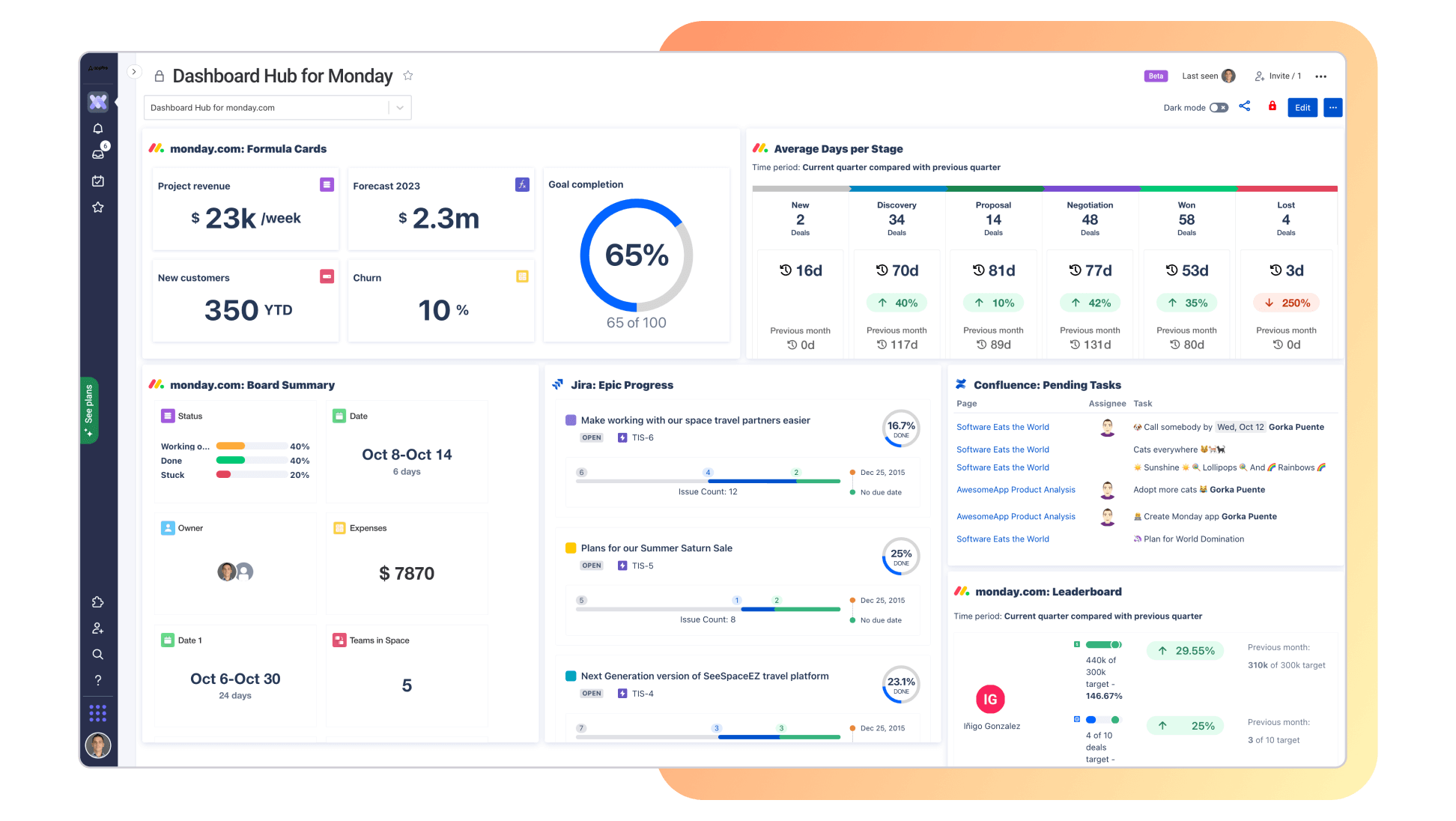
Image Source: Monday CRM
I’ve always liked Monday.com for project management, but using it as a CRM integrated with QuickBooks was truly helpful. Once connected, I was able to create custom boards where invoices, payments, and customer communication all lived side-by-side. It gave me a visual overview of where each deal and client stood financially, which made team collaboration smoother.
What I loved most was the ability to define custom automation—like triggering a payment reminder when an invoice was marked overdue in QuickBooks, or updating a project status when payment was received. The drag-and-drop interface made setup easy, and the mobile app let me check financial updates from anywhere.
That said, importing large amounts of data into Monday CRM took some patience. But if you like working visually and want the best CRM for QuickBooks Online that doubles as a workflow tool, Monday.com is incredibly flexible.
Pros:
- Generate and manage invoices for clients and track their status from within the CRM.
- Craft custom workflows, sales pipelines, and automations tailored to your business.
- Process payments automatically or sync payment status updates to save time.
- Customize the integration by defining triggers (e.g., new deal closed) and corresponding actions (e.g., create invoice in QuickBooks).
Cons:
- Importing a very large volume of data at once can be challenging and occasionally requires splitting into batches.
- While highly customizable, extensive tweaks can make the system complex; a balance is needed to keep it user-friendly.
Pricing: Starts at $12/user/month.
Looking for something different? Check out these 7 Best Monday CRM Alternatives for options that might suit your workflow and QuickBooks integration needs even better.
12. Appy Pie Automate – Best for No-Code Workflows
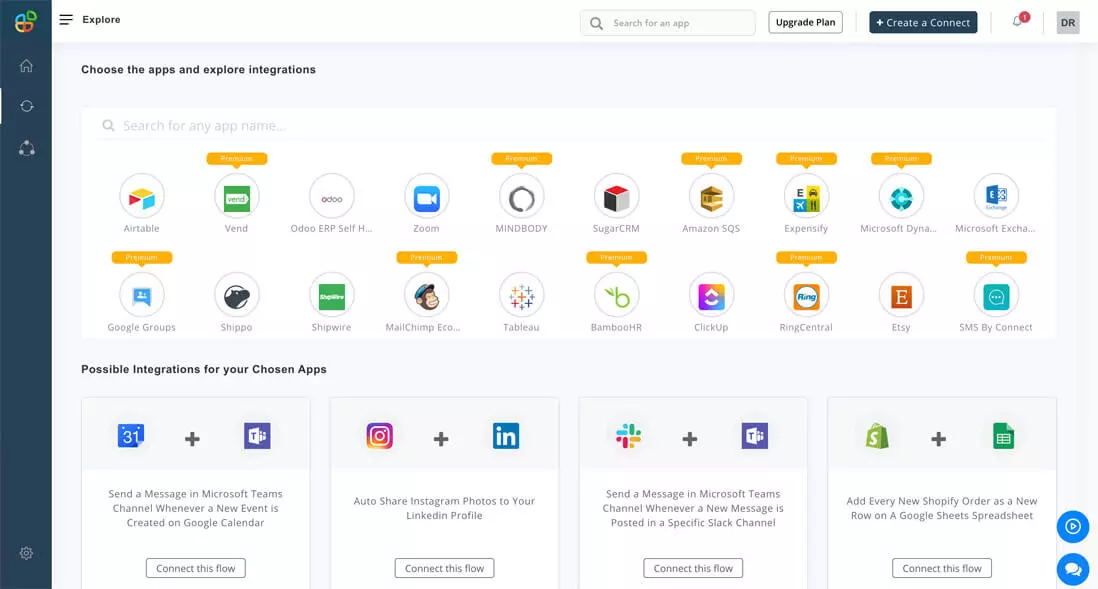
Image source: Appy Pie Automate
I started using Appy Pie Automate to connect QuickBooks with my CRM and email marketing tools, and it turned out to be a huge time-saver. What impressed me most was how simple it was to set up automation without writing a single line of code. The drag-and-drop interface made it easy to create workflows that automatically updated customer records, synced invoices, and even sent Slack alerts when payments came through.
The integration also helped me reduce manual errors. For instance, whenever a new deal closes in my CRM, QuickBooks automatically creates an invoice and updates the payment status. It felt like having a virtual assistant handling all the repetitive accounting and data tasks in the background.
I did notice that the free plan has limitations on workflow runs, and sometimes there’s a small delay in data syncing if multiple automations are triggered at once. But overall, it’s a reliable choice for anyone who wants to automate QuickBooks tasks effortlessly.
Pros:
- Extensive app library (1000+ apps) covers virtually every business tool
- Automatically syncs invoices, customers, and payments in real time
- Reduces manual data entry and boosts efficiency across tools
- Offers conditional logic and error-handling for smoother automations
Cons:
- Some advanced use cases (custom API actions, complex logic) may require technical expertise
- Workflows on lower-tier plans can experience occasional latency under heavy load
Pricing: Free plan available; paid plans start at $8/user/month.
How to Integrate BIGContacts CRM with QuickBooks
Now that we have explored the different CRM options, let me quickly guide you on how to integrate BIGContacts CRM with your QuickBooks account.
Here is what you need to do:
Step 1: If you don’t have a BIGContacts CRM account, you can create one for free. If you already have one, simply enter the valid credentials and click on the sign-in button.
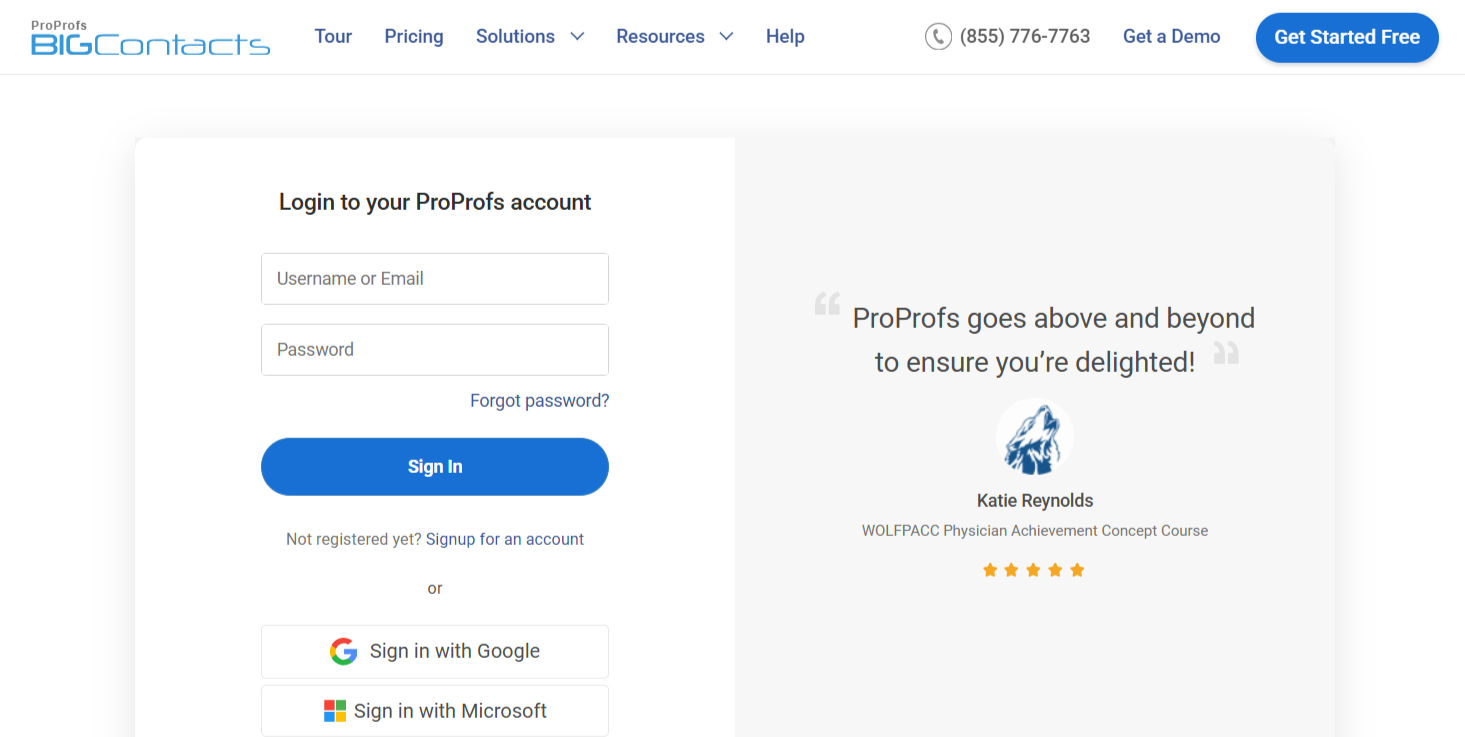
Step 2: Navigate to the Admin section and then click on the Add-ons & API.
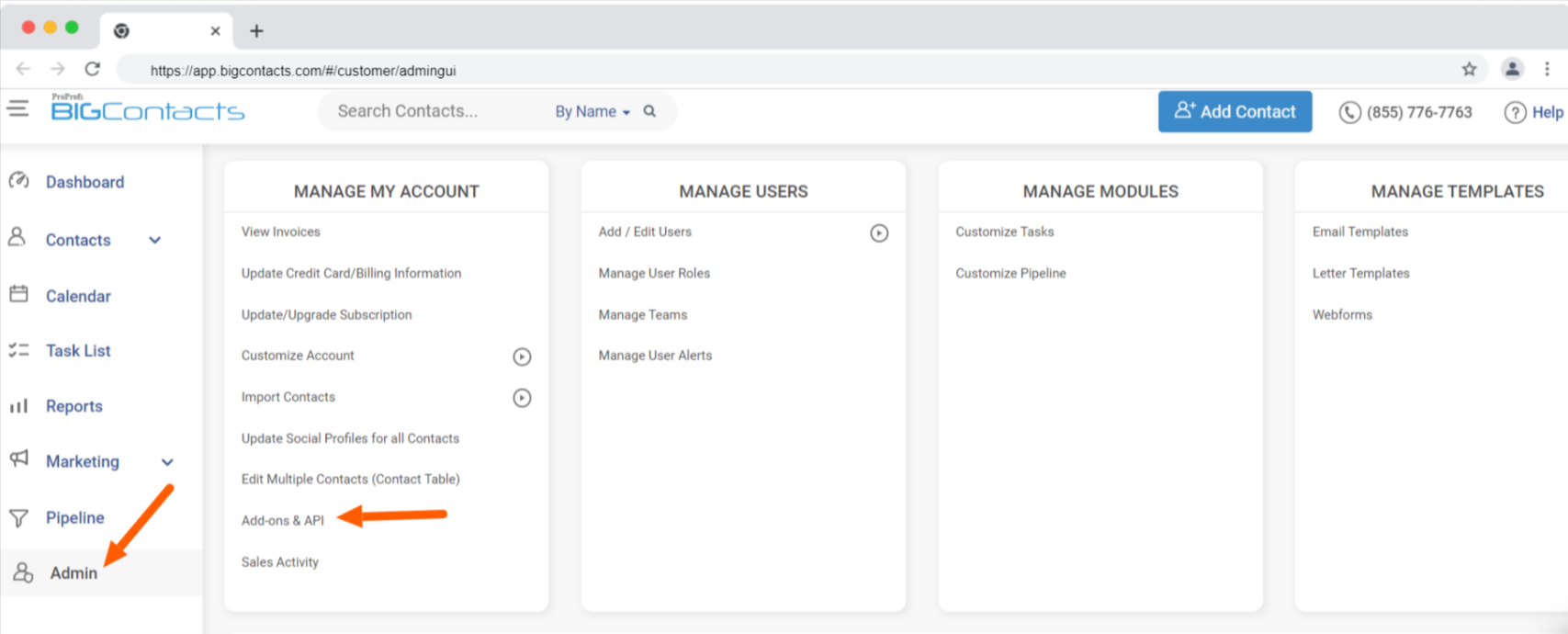
Step 3: Click on the ‘Connect QuickBooks Account‘ button.
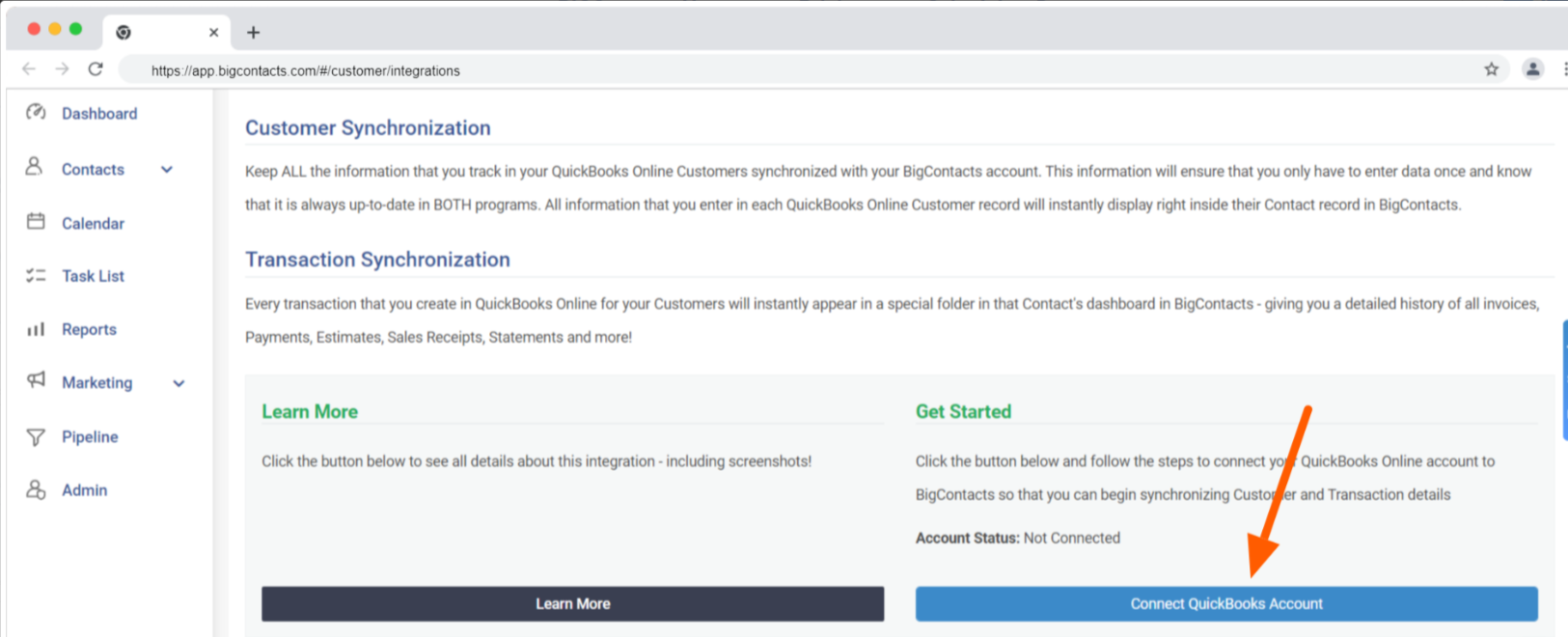
Step 4: Enter the QuickBooks credentials and then click on the sign-in button to connect.
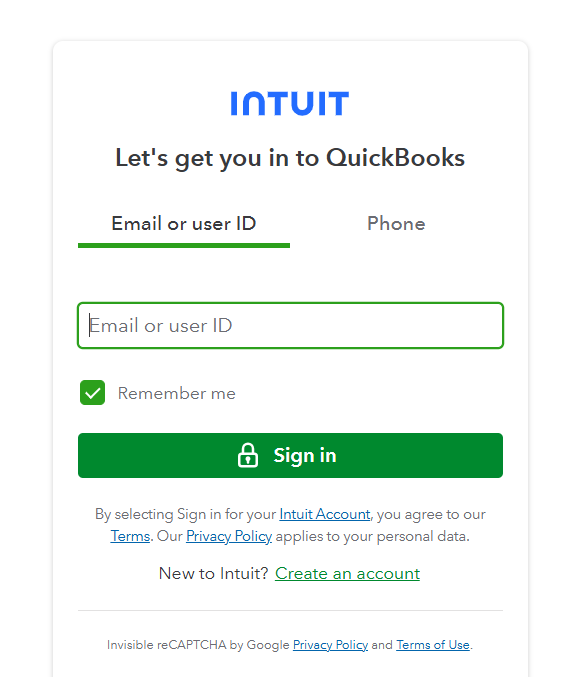
Step 5: If this screen appears for you, enter the company name; if not, select the company from the dropdown menu. Now that QuickBooks is connected to sync the data, click the ‘Connect‘ button.
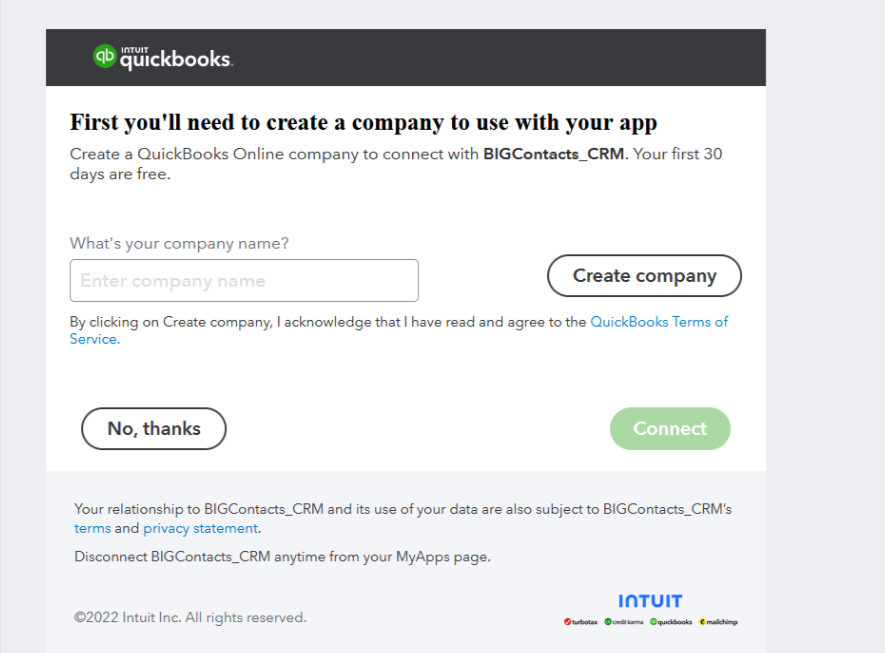
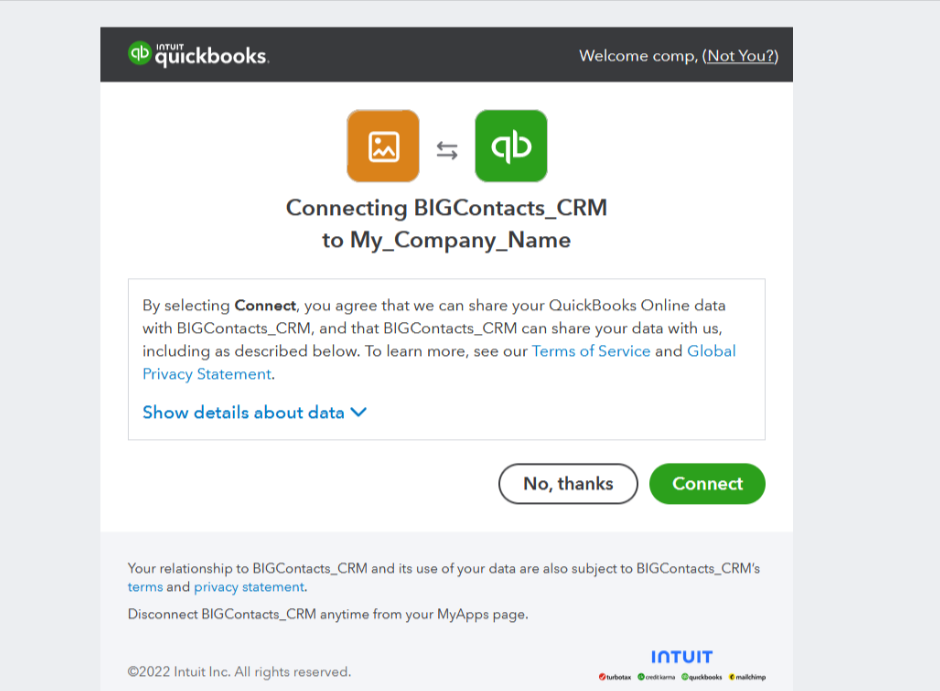
If you still need help, feel free to read the complete integration guide.
What Are the Benefits of QuickBooks CRM Integration
Now, let’s understand the advantages that QuickBooks CRM integration can offer.
- It reduces the length of the sales cycle by making it easier to deliver quotes, invoices, and reminders to customers.
- With a CRM tool connected to QuickBooks, you can track preferences and deliver more personalized experiences to your clients.
- The data is automatically synchronized between both platforms, saving you the trouble of logging everything manually.
- Your accounting and sales teams can share information more efficiently and collaborate toward increasing business profitability.
- Track all related invoices and access payment histories for your customers to increase the chances of upselling.
- Generate reports to analyze your financial performance and identify areas for improvement. This also empowers you to make better decisions for the future.
- Keep track of overdue payments and get notified in real-time about payment updates.
- Keep your financial records clean by only including converted prospects in the QuickBooks account, while other leads can be stored in the CRM system.
How We Evaluated the Best QuickBooks CRM Integration Options
To collate this list of the best CRM for QuickBooks, we have taken into consideration:
1. Pricing:
We have taken the pricing structure of the software into account to find the most affordable and scalable solutions, ensuring these options offer good value for your investment.
2. Functionality:
We have considered the general features that the tools offer to qualify them as suitable QuickBooks CRM solutions. This includes assessing whether each CRM provides a robust QuickBooks integration (for example, seamless syncing of contacts, invoices, and other data).
3. Ease of Use:
We have included tools that are easy to implement and use. Such straightforward implementation and usage make for improved efficiency. We paid special attention to how simple it is to set up the QuickBooks integration without requiring extensive technical expertise, so you can get up and running quickly.
Looking for no-fuss options? Explore these Simple CRM Systems for Small Businesses that are easy to set up, budget-friendly, and ideal for small teams.
4. Flexibility:
The tools included in this list are highly customizable and offer extensive flexibility for you to modify various modules based on your needs. For instance, the ability to customize fields or workflows (including those related to QuickBooks data) was considered a plus.
5. User Reviews:
We have considered reviews from real users of the tools to better understand their functionality and reliability. In particular, user feedback about the QuickBooks integration (stability, support quality, etc.) helped gauge each solution’s real-world performance.
Manage Finances Effectively With QuickBooks CRM Integration
Integration of CRM with QuickBooks can offer a complete picture of your customers in one place, saving time for your business. Moreover, you can get valuable insights to improve financial performance and customer satisfaction.
The 12 top choices for QuickBooks CRM integration listed above are straightforward solutions that can streamline your customer relationship management and accounting efforts. Whichever CRM tool you choose, make sure to avail its free trial to get a first-hand experience of its usability. Also, prepare an integration plan with a timeline (including data migration and team training) to ensure your staff transitions smoothly to the new system.
One of the most powerful CRM tools to connect with your QuickBooks account is BIGContacts. The tool offers a forever-free plan, advanced automation capabilities, helping you create workflows that enhance overall productivity. Moreover, the tool is extensively customizable, so you can easily adapt it to suit the needs of your organization.
Frequently Asked Questions
Which is the best CRM that integrates with QuickBooks Online?
Some of the best CRMs for QuickBooks Online include BIGContacts, HubSpot, Zoho CRM, and Keap. These tools offer direct integrations or third-party connectors that sync contacts, invoices, payment statuses, and communication history with QuickBooks Online in real-time.
Can I use QuickBooks Desktop with CRM software?
Yes, but the options are more limited compared to QuickBooks Online. Some CRM systems support QuickBooks Desktop using middleware tools like Zapier, Connex, or custom API connectors. Always check if the CRM explicitly supports your QuickBooks Desktop version before integrating.
What features should I look for in a CRM that integrates with QuickBooks?
When choosing a CRM that integrates with QuickBooks, look for features like real-time syncing of contacts and invoices, payment tracking, and workflow automation. Ensure it includes lead and pipeline management, financial reporting, and mobile access. The CRM should offer either native or third-party QuickBooks integration for smooth data sharing and minimal manual work.
FREE. All Features. FOREVER!
Try our Forever FREE account with all premium features!



